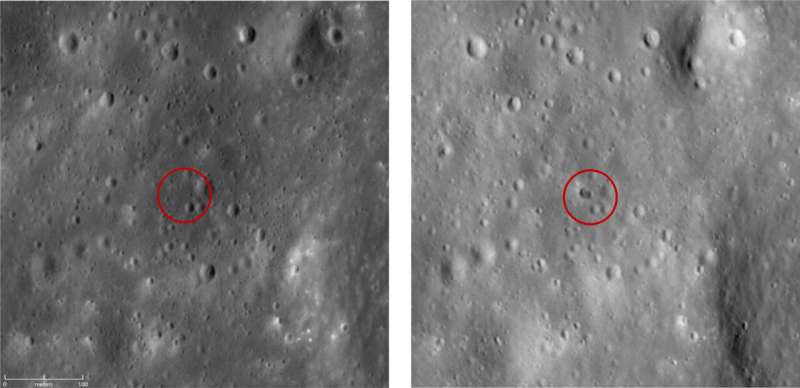November 17, 2023 report
This article has been reviewed according to Science X's editorial process and policies. Editors have highlighted the following attributes while ensuring the content's credibility:
fact-checked
peer-reviewed publication
trusted source
proofread
Study of WE0913A moon impactor shows it was a Chinese booster rocket with an unknown object attached

A team of aerospace and mechanical engineers from the University of Arizona, California Institute of Technology, Project Pluto and the Planetary Science Institute has found evidence strongly suggesting that the March 4, 2022, WE0913A moon impactor was a Chinese booster rocket with an unknown object attached to its side.
In their paper published in The Planetary Science Journal, the group describes how they were tracking the object before it crashed into the moon, and what they learned by doing so.
On March 4, 2022, an object of unknown origin crashed onto the surface of the moon. It was originally theorized that the object was the upper stage of a Falcon 9 rocket. Tracking of launches soon disproved that theory and researchers instead decided the object was a Chinese booster rocket. They also found that the impact had left a double crater on the moon, suggesting that the impactor was unusual. As it turned out, the researchers on this new effort had been tracking the impactor for seven years prior to its crashing onto the lunar surface and thus knew its origins.
During their study of the object, the research team had backtracked its path and found it to be a booster rocket for the Chang'e 5-T1 mission—one of several missions launched by China to test the feasibility of sending a probe to the moon and retrieving a sample of moon rocks.
The team also attempted to learn more about the booster as it sailed through space—in comparing its light curve, they found that it did not wobble the way other boosters did. Instead, something was causing it to tumble in an orderly fashion. A booster is typically nothing more than an empty shell with a heavy engine affixed to one side. Its asymmetry typically leads to a lot of wobbling. The lack of such a wobble suggested that Chinese engineers had attached something else to the shell opposite the engine, evening out its weight distribution.
The researchers note that whatever that something else was, it accounted for the second part of the double crater created when the booster slammed into the surface of the moon. No one from China has commented on the nature of the booster, or even confirmed that it was of Chinese origin.
More information: Tanner Campbell et al, Physical Characterization of Moon Impactor WE0913A, The Planetary Science Journal (2023). DOI: 10.3847/PSJ/acffb8
Journal information: The Planetary Science Journal
© 2023 Science X Network





















